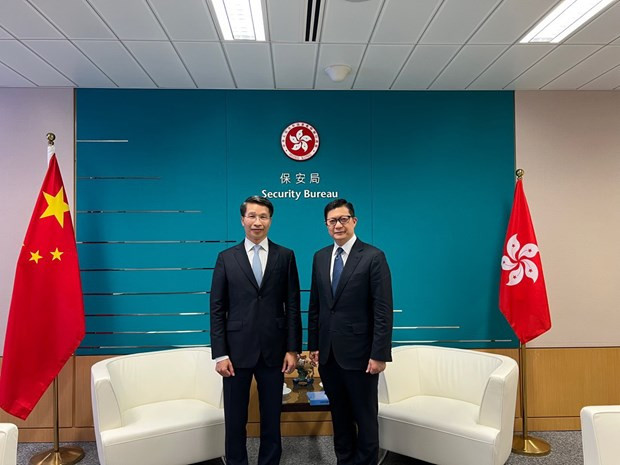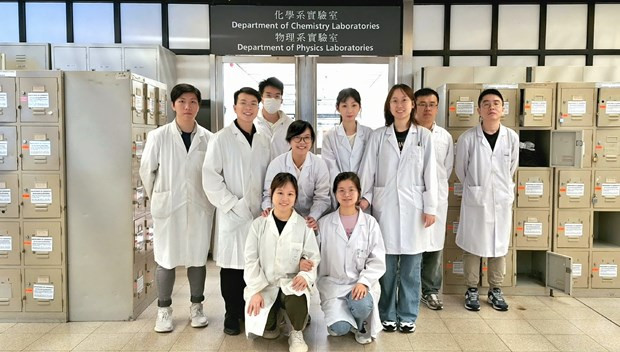Changes in the loosening of work visa policies by the Hong Kong Special Administrative Region (China) government promise to bring more job opportunities here for Vietnamese workers.

After the “talent attraction” phase in 2022, the Hong Kong Special Administrative Region government has begun to shift to “talent retention,” with one of the important measures being the relaxation of work visa policies.
This is the way to help Hong Kong solve the problem of "human resource shortage" to serve the economic recovery process, continuing to improve the competitiveness of this international financial center.
These changes promise to bring more job opportunities in Hong Kong for Vietnamese workers.
According to the announcement of the Hong Kong Immigration Department, from October 25, 2023, eligible Vietnamese citizens can apply to enter Hong Kong under the General Employment Policy (for professionals and entrepreneurs), the Quality Migration Programme, the Technology Talent Recruitment Programme, the Programme for Second Generation of Permanent Residents in Hong Kong and the Outstanding Talent Programme.
In addition, eligible Vietnamese citizens can apply under the GBA Graduate Student Program - full-time graduates from universities in the Guangdong-Hong Kong-Macau Greater Bay Area.
These are schools jointly established by the central government of China and the Hong Kong government in accordance with the Regulations of China on Cooperation between China and Foreign Countries in the Management and Operation of Schools.
Vietnamese people can find information about the above programmes, including eligibility criteria and application procedures, on the Immigration Department website at www.immd.gov.hk.
Also from October 25, Vietnamese citizens in certain categories can apply for multiple-entry visas of up to 24 months and a stay of no more than 14 days per entry.
The application requirements include (a) the applicant having a genuine need to visit Hong Kong regularly; and (b) the applicant having visited Hong Kong three or more times “without incident” or from two or more countries or territories in the past 36 months; or (c) the applicant having previously been granted entry into Hong Kong for work, training, residence or study in the past 24 months.
Previously, visitors coming for business or tourism were only granted single-entry visas, valid for 14 days and 7 days respectively.
Vietnamese Consul General in Hong Kong Pham Binh Dam said the decades-long ban on Vietnamese workers is a "bottleneck" in bilateral relations.
The fact that Vietnam is among the 7 countries with work visa restrictions is politically inappropriate, hinders cooperation and employment opportunities for Vietnamese people, and causes difficulties for Vietnamese people and businesses to travel due to complicated visa procedures requiring a lot of paperwork.
Therefore, the Consulate General has made efforts to work with government agencies, members of the Legislative Council, associations, businesses, and influential individuals in Hong Kong to request changes, and at the same time coordinate with Vietnamese authorities to handle a number of outstanding issues of concern to Hong Kong.
After a long process of campaigning, fighting, coordinating and cooperating with the authorities of both sides, Hong Kong has officially opened work visas for Vietnamese citizens, and at the same time opened 24-month multiple-entry visas for Vietnamese businesses and tourists in need.
This change, on the one hand, meets Hong Kong's need for finding and attracting talent, and on the other hand, opens up many opportunities for employment, human resource development, and travel convenience for Vietnamese businesses and people.
According to Consul General Pham Binh Dam, Hong Kong is the fourth largest international financial center in the world, an international trade and transportation center, and is also a city that is home to many of the world's top universities.
In Hong Kong, Vietnamese workers have the opportunity to work in a highly competitive international environment, with good legal conditions, low tax rates, and high income.

On the other hand, Hong Kong is a great place for Vietnamese workers to improve their skills and develop themselves, helping to meet the long-term demand for high-quality human resource training of the economy.
Young talents after working in Hong Kong will mature and have skills, reach international stature and level, this is the force that Vietnamese businesses and organizations need in the coming years.
Mr. Pham Binh Dam stated that with this change in policy, the Consulate General will continue to work with agencies and businesses to promote sending Vietnamese people to work in Hong Kong in suitable fields that Vietnam can meet and Hong Kong has demand for.
Ms. Chu Khoi Binh, senior human resources consultant and CEO of Acts Consulting Company, assessed that in recent years, Vietnam has had a lot of IT talent, and the Hong Kong government's loosening of visa policies is aimed at attracting this group of high-quality workers.
Vietnamese people currently living and working in this special administrative region are also very happy with the above decision of the Hong Kong government.
Dr. Thi Quoc Huy, who is currently working at City University of Hong Kong (CityU) and Hong Kong Polytechnic University (PolyU), believes that the new visa policy will open up more job opportunities for Vietnamese people. Vietnamese people, especially graduates in Hong Kong, will also find it easier to change jobs without worrying about visa issues when leaving their old jobs.
In addition, the relaxation of visa policies also creates opportunities for short-term educational and research cooperation between universities on both sides. Vietnamese students graduating from Hong Kong and returning to Vietnam can also easily create a bridge of cooperation between the two sides.
According to Dr. Nguyen Hoang Long, a PhD student at the Chinese University of Hong Kong (CUHK), Hong Kong's change in visa policy for Vietnamese citizens is a positive development in the relationship between the two sides, with special significance in promoting cultural and educational exchanges and economic cooperation. These new policies have initially removed barriers and created favorable conditions for comprehensive cooperation.
Hong Kong is not only known as a vibrant financial center of Asia, but also famous for its world-class education system.
Dr. Nguyen Hoang Long believes that these policies will bring many benefits to Hong Kong, as more and more talents and high-quality labor force from Vietnam come to study and work here, contributing to the development of this special administrative region. In addition, the expansion of the tourist visa policy will create motivation to attract more Vietnamese tourists to visit and experience Hong Kong in the future.
A survey conducted by the Hong Kong General Chamber of Commerce (HKGC) in April 2023 found that 74% of the companies surveyed were facing a shortage of skilled workers, and more than 80% of them said the situation had lasted for more than a year. COVID-19 prevention efforts have prevented talent from coming to Hong Kong, and emigration has also led to a brain drain.
Official figures show that Hong Kong’s working population has shrunk by more than 100,000 over the past two years, from 3.57 million in the second quarter of 2020 to 3.46 million in the fourth quarter of 2022. More than 70% of those leaving are high-tech talent with managerial and professional experience.
The Executive Policy Report delivered by Chief Executive John Lee to the Legislative Council on October 25 also stressed the importance of attracting talent. Therefore, the Hong Kong government will continue to attract, retain and nurture local talent. Measures introduced in 2022 to attract investment and talent have achieved good results.
As of the end of September, Hong Kong had attracted about 160,000 applications, of which more than 100,000 were approved and about 60,000 people had arrived in Hong Kong.
The Hong Kong government will also expand the list of universities under the “High-level Talent Scheme”, with eight top universities from Hong Kong and overseas to 184 from November.
After 1 year of implementing and reviewing the talent attraction policy, the Hong Kong government has moved from the orientation exploration phase to the precise response phase, with adjustments to the subjects and countries attracting talents.
On October 30, the "Talent Service Office" was officially established to support talents coming to Hong Kong and monitor their development and needs. Currently, the salary after graduation of university graduates in Hong Kong is around 20,000-30,000 HKD (about 60-90 million VND).
According to VNA